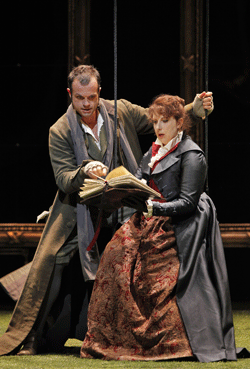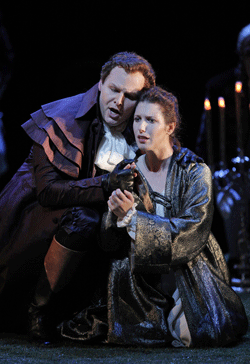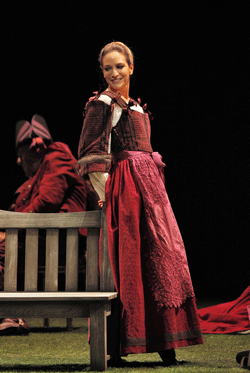26 Oct 2011
Don Giovanni in San Francisco
Ossia Maestro Watching in Fog City. Ten years ago it was German provincialism, now it is the Italian sort wanting to take root in the War Memorial Opera House.

Ossia Maestro Watching in Fog City. Ten years ago it was German provincialism, now it is the Italian sort wanting to take root in the War Memorial Opera House.
San Francisco Opera unveiled a new Don Giovanni just now in nearly direct competition with the new Giovanni from the Met (you can see it soon on Live in HD). Of course the Met has avoided an American take on this old story as well, preferring to impose still more British artistic imperialism on Americans.
 Marco Vinco as Leporello and Serena Farnocchia as Donna Elvira
Marco Vinco as Leporello and Serena Farnocchia as Donna Elvira
The SFO Giovanni is all about egoism, and we are not talking just about the libidinous Don. We are of course talking about SFO music director Nicola Luisotti. Like the Don, this maestro is much larger than life, and equally astonishing in his powers. But the Luisotti Don Giovanni is not about sex as it is for most stage directors, it is about how Luisotti can take you to the brink of lyric orgasm and hold you there longer than maybe you ever thought possible.
Of course the maestro did need some collaborators to support his lyric blowout, specifically a general director willing to suspend artistic judgement and engage a stage director who is at home on secondary Italian stages where standards are parochial to say the least. One Gabriele Lavia was Luisotti’s collaborator for his Salome in Bologna shortly after the San Francisco one (if in Bologna it was orchestrally more brilliant the staging was even cornier than in San Francisco).
The comedy of Mozart’s sublime tragicommedia in San Francisco was watching Sig. Lavia keep the maestro’s singers on a plain about 4 feet wide across the stage apron where no one could escape the maestro’s thrall. And still tell the story. It sometimes worked, sort of, belying the not-too-distant link of Mozartian dramaturgy to the linear and static placement of singers for Baroque opera seria.
 Shawn Mathey as Don Ottavio and Ellie Dehn as Donna Anna
Shawn Mathey as Don Ottavio and Ellie Dehn as Donna Anna
General Director Gockley as well engaged a small scale, very Italiate diva, the splendid Serena Farnocchia whose bright lyric voice is on the small side for Donna Elvira, and light enough to negotiate, almost, Elvira’s very difficult music at the speed of light. The maestro succeeded in upstaging Sig.ra Farnocchia’s “Mi tradi” with a hyper emotional orchestral accompaniment to its recit (grotesque heaving).
Donna Anna was the American soprano Ellie Dehn who had made little impression as the Figaro Countess last fall. But she glowed vocally as a retiring Donna Anna, her just ample enough voice blended perfectly in ensembles, having shown with hanging beauty and fine musicianship in her first act aria "Or sai chi l'onore.” American tenor Shawn Mathey was Don Ottavio, but not the usual impotent one. Turning the tables he was the singer with the coglioni rather than the usual Giovanni heroines. Both Don Ottavio arias were blockbusters, exposing forceful, detached tones in quick passages and fioratura, and letting tone and feeling explode in lyric passages. Both Ms. Dehn and Mr. Mathey managed a synergy with the maestro to sublime effect.
 Kate Lindsey as Zerlina
Kate Lindsey as Zerlina
Ignoring all potential complexities of relationship to his master, Italian bass Marco Vinco made Leporello a cute, almost expendable character, needed but not wanted. Though he, like most all Leporellos earned the biggest ovation. Like Leporello, Zerlina and Masetto were needed only for the maestro’s beautifully wrought ensembles, but not much more. Zerlina was ably and musically sung by Kate Lindsey, Adler Fellow Ryan Kuster made a cute Masetto.
San Francisco regular, bass baritone Lucas Meachem filled the shoes of Don Giovanni with aplomb and even charm. Mozart did not endow his most loved character with arias of consequence, and a stage director must dig way beneath the surface to intuit any complexity of personality, obviously not the scope of this production. But the Don is always big, and he lets it all hang out in his explosion at the end of the first act. Needless to say this was the meat of the maestro who turned it into an absolute frenzy. Mr. Meachem could not possibly compete, though he gave it a good try. The real Don would have thrown this maestro the very graphic up-yours gesture and walked off the stage.
From the downbeat of the overture Mo. Luisotti stated that this Mozart opera was an orchestral and musical process, its very sound groaning with importance, reminding us that the maestro has made his orchestra into one of the world’s fine pit ensembles. The beginning foretold the absolutely literal ending with the Commendatore, ably delivered by bass Morris Robinson, wreaking his vengeance on the Don in gigantic symphonic terms. We discovered last fall that after the maestro’s over-the-top musical dénouement in The Marriage of Figaro that he could not touch the quiet Mozartian humanity that ends Figaro. And here he does not even look for Mozart’s humanity, ending Giovanni with the Don’s noisy descent into hell rather than letting the quietly splendid Prague sextet wipe up the mess.
It was a fun evening. However Mozart and San Francisco might equally enjoy a bit of operatic integrity.
Michael Milenski